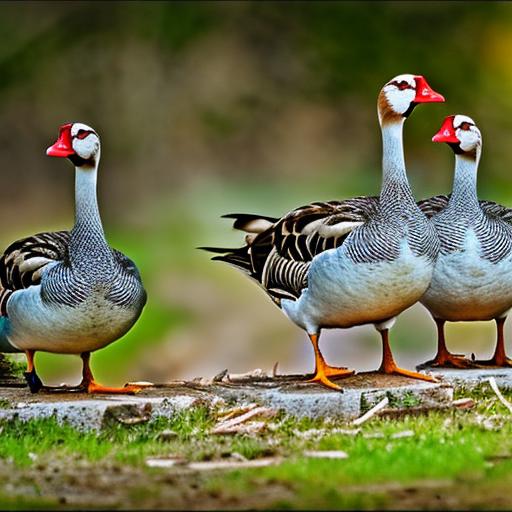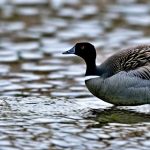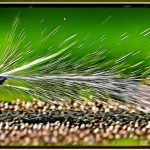Geese invading yards and causing damage is a common problem that many homeowners face. These large birds can be a nuisance, leaving behind droppings, damaging lawns, and even becoming aggressive towards humans and pets. Fortunately, there are several methods that can be used to keep geese away and prevent them from causing further damage.
One of the most effective ways to deter geese is to understand their behavior and what attracts them to certain areas. By understanding their nesting habits and territorial behavior, homeowners can take proactive measures to discourage geese from invading their yards. Additionally, creating physical barriers, using visual deterrents, installing sound devices, using natural repellents, maintaining a clean yard, planting certain types of vegetation, and creating water features can all help in keeping geese at bay. If all else fails, seeking professional help may be necessary to deal with persistent geese problems.
Key Takeaways
- Geese are attracted to open spaces with easy access to water and food sources.
- Physical barriers such as fences and netting can effectively keep geese out of certain areas.
- Visual deterrents like scarecrows and reflective tape can startle geese and discourage them from landing.
- Sound devices like speakers playing predator calls can also be effective in repelling geese.
- Natural repellents like citrus sprays and garlic can be used to keep geese away, but may need to be reapplied frequently.
Understanding the Behavior of Geese
Geese are attracted to certain areas for a variety of reasons. They are herbivores and are drawn to areas with abundant food sources such as grassy lawns or agricultural fields. They also prefer areas near bodies of water where they can find safety and easily access food. Understanding these preferences can help homeowners identify potential problem areas in their yards.
Geese are also known for their nesting habits and territorial behavior. They typically nest near water sources and will aggressively defend their nests and surrounding territory. This territorial behavior can lead to conflicts with humans and pets if geese feel threatened or perceive an intrusion into their space. By understanding these behaviors, homeowners can take steps to discourage geese from nesting in their yards and prevent conflicts.
Creating Physical Barriers to Keep Geese Out
One effective method of keeping geese out of yards is by creating physical barriers. Fences or netting can be installed around the perimeter of the yard to prevent geese from entering. It is important to ensure that the barriers are properly installed and maintained to be effective. Fences should be at least three feet high and have small enough gaps to prevent geese from squeezing through. Netting should be securely fastened and regularly checked for any damage or gaps.
Another option is to use floating barriers in bodies of water to prevent geese from accessing certain areas. These barriers can be made of floating ropes or buoys that create a physical barrier that geese are reluctant to cross. It is important to regularly check and maintain these barriers to ensure their effectiveness.
Using Visual Deterrents to Scare Geese Away
Visual deterrents can also be effective in scaring geese away from yards. Scarecrows, balloons, and other visual deterrents can be placed strategically around the yard to create a sense of danger and discourage geese from landing or nesting. It is important to regularly change the location and appearance of these deterrents as geese can become accustomed to them over time.
Reflective objects such as shiny tape or aluminum foil can also be effective in deterring geese. The movement and reflection of light can startle geese and make them feel unsafe, causing them to avoid the area. These objects should be placed in areas where geese are likely to land or congregate, such as near bodies of water or on open lawns.
Installing Sound Devices to Repel Geese
Sound devices can be used to repel geese by emitting loud noises that are unpleasant for them. These devices can range from simple noisemakers such as air horns or whistles, to more sophisticated electronic devices that emit distress calls or predator sounds. It is important to choose a device that is appropriate for the area and not too disruptive to neighbors.
It is also important to regularly change the sounds emitted by these devices as geese can become accustomed to certain noises over time. By periodically changing the sounds, homeowners can maintain the effectiveness of the deterrent and prevent geese from becoming habituated to the noise.
Using Natural Repellents to Keep Geese at Bay

Natural repellents can be an effective way to keep geese away from yards. Garlic, pepper, vinegar, and other strong-smelling substances can be sprayed or sprinkled around the yard to create an unpleasant environment for geese. These repellents should be reapplied regularly, especially after rain or watering, to maintain their effectiveness.
It is important to note that natural repellents may need to be reapplied more frequently than chemical repellents and may not be as effective in all situations. However, they can be a safe and environmentally friendly option for homeowners who prefer to avoid the use of chemicals.
Maintaining a Clean and Tidy Yard to Discourage Geese
Keeping the yard clean and free of food and debris can also help discourage geese from invading. Geese are attracted to areas with abundant food sources, so it is important to remove any spilled birdseed, pet food, or other food sources that may attract them. Additionally, regularly cleaning up after pets can help prevent geese from being attracted to the yard.
It is also important to remove any debris or clutter from the yard that may provide hiding places or nesting sites for geese. By keeping the yard clean and tidy, homeowners can create an environment that is less attractive to geese.
Planting Certain Types of Vegetation to Keep Geese Away
Planting certain types of vegetation can also help deter geese from invading yards. Geese prefer open grassy areas where they have a clear line of sight and easy access to food. By planting prickly bushes or other types of vegetation that geese do not like, homeowners can create barriers that make it less appealing for geese to land or nest in their yards.
It is important to choose plants that are appropriate for the area and climate to ensure their success. Consulting with a local landscaper or gardening expert can help homeowners select the right plants for their specific situation.
Installing Fences or Netting to Block Geese from Entering
In addition to creating physical barriers around the perimeter of the yard, homeowners can also install fences or netting to block geese from entering certain areas. This can be particularly useful for protecting specific areas such as gardens or flower beds.
Fences should be at least three feet high and have small enough gaps to prevent geese from squeezing through. Netting should be securely fastened and regularly checked for any damage or gaps. By blocking geese from accessing certain areas, homeowners can protect their plants and prevent damage.
Creating a Water Feature to Deter Geese from Landing
Creating a water feature such as a fountain or pond can also help deter geese from landing in yards. Geese prefer areas near bodies of water where they can find safety and easily access food. By creating a water feature that is not suitable for geese, homeowners can make their yards less attractive to these birds.
It is important to properly maintain the water feature to ensure its effectiveness. Regularly cleaning and treating the water, as well as removing any debris or vegetation that may attract geese, can help prevent them from landing and nesting in the area.
Seeking Professional Help to Deal with Persistent Geese Problems
If all else fails, it may be necessary to seek professional help to deal with persistent geese problems. Wildlife control experts or landscapers who specialize in dealing with geese can provide advice and assistance in finding the best solution for the specific situation.
These professionals may use more advanced methods such as trapping and relocating geese, or implementing more intensive deterrent measures. They can also provide ongoing maintenance and monitoring to ensure that the problem is effectively resolved.
In conclusion, there are several methods that can be used to keep geese away and prevent them from causing damage in yards. By understanding the behavior of geese and what attracts them to certain areas, homeowners can take proactive measures to discourage geese from invading their yards. Creating physical barriers, using visual deterrents, installing sound devices, using natural repellents, maintaining a clean yard, planting certain types of vegetation, creating water features, and seeking professional help are all effective strategies for keeping geese at bay.
It is important for homeowners to try different methods and find what works best for their specific situation. Geese can be persistent and adaptable, so it may take a combination of methods to effectively deter them. By taking proactive measures and seeking professional help if needed, homeowners can successfully keep geese away and protect their yards from damage.
If you’re looking for ways to keep geese out of your yard, you might also be interested in learning about creative ideas for the interior of your chicken coop. Poultry Wizard has an informative article on chicken coop interior ideas that can help you optimize the space and create a comfortable environment for your feathered friends. From nesting boxes to roosting bars, this article offers practical tips and inspiration to make your chicken coop a cozy and functional space. Check it out here!
FAQs
What are geese?
Geese are waterfowl birds that belong to the family Anatidae. They are known for their long necks, webbed feet, and distinctive honking calls.
Why do geese come into yards?
Geese may come into yards in search of food, water, or shelter. They are also attracted to open spaces, such as lawns and fields, where they can graze and rest.
What problems can geese cause in yards?
Geese can cause a number of problems in yards, including damage to landscaping, fouling of lawns and walkways with droppings, and aggressive behavior towards people and pets.
How can I keep geese out of my yard?
There are several methods for keeping geese out of your yard, including installing physical barriers like fences or netting, using repellents like noise makers or decoys, and modifying the landscape to make it less attractive to geese.
Are there any humane ways to deter geese?
Yes, there are several humane ways to deter geese, such as using noise makers, decoys, or visual deterrents like reflective tape or balloons. It is important to avoid harming or injuring the geese in the process.
What should I do if I encounter aggressive geese?
If you encounter aggressive geese, it is important to stay calm and avoid provoking them. Slowly back away from the geese and give them plenty of space. If necessary, seek help from a professional wildlife control service.
Meet Walter, the feathered-friend fanatic of Florida! Nestled in the sunshine state, Walter struts through life with his feathered companions, clucking his way to happiness. With a coop that’s fancier than a five-star hotel, he’s the Don Juan of the chicken world. When he’s not teaching his hens to do the cha-cha, you’ll find him in a heated debate with his prized rooster, Sir Clucks-a-Lot. Walter’s poultry passion is no yolk; he’s the sunny-side-up guy you never knew you needed in your flock of friends!







